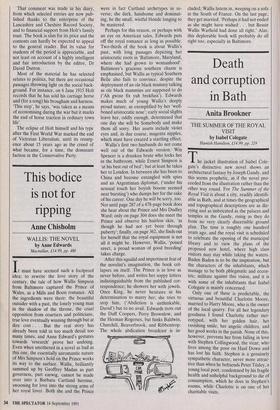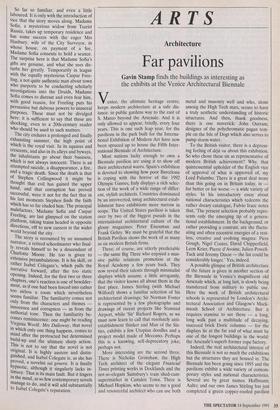Death and corruption in Bath
Anita Brookner
THE SUMMER OF THE ROYAL VISIT by Isabel Colegate
!famish Hamilton, f14. 99, pp. 219
The jacket illustration of Isabel Cole- gate's distinctive new novel shows an architectural fantasy by Joseph Gandy, and this seems prophetic, as if the novel pro- ceeded from the illustration rather than the other way round. For The Summer of the Royal Visit is about a city, readily identifi- able as Bath, and at times the geographical and topographical descriptions are as diz- zying and as imbricated as the palaces and temples in the Gandy, rising as they do from no very clearly discernible ground plan. The time is roughly one hundred years ago, and the royal visit is scheduled to celebrate the opening of the municipal library and to view the plans of the proposed new hotel, where high class visitors may stay while taking the waters. Baden Baden is to be the inspiration, but the characters of the inhabitants, which manage to be both phlegmatic and eccen- tric, militate against this vision, and it is with some of the inhabitants that Isabel Colegate is mainly concerned.
Only one of these is predictable, the virtuous and beautiful Charlotte Moore, married to Harry Moore, who is the owner of the local quarry. For all her legendary goodness I found Charlotte rather ster- eotyped, with her golden hair, her ravishing smile, her angelic children, and her good works in the parish. None of this, however, prevents her from falling in love with Stephen Collingwood, the vicar, who lives among the poor on Haul Down and has lost his faith. Stephen is a genuinely sympathetic character, never more attrac- tive than when he befriends Peter Tilsley, a young local poet, condemned by his fragile health and unhelpful background to die of consumption, which he does in Stephen's rooms, while Charlotte is on one of her charitable visits.
So far so familiar, and even a little laboured. It is only with the introduction of vice that the story moves along. Madame Sofia, a mysterious widow from Tsarist Russia, takes up temporary residence and has some success with the eager Mrs Hanbury, wife of the City Surveyor, in whose house, on payment of a fee, Madame Sofia consents to hold a seance. The surprise here is that Madame Sofia's gifts are genuine, and what she sees dis- turbs her greatly. Temporarily in league with the equally mysterious Caspar Free- ling, a not quite authentic man about town who purports to be conducting scholarly investigations into the Druids, Madame Sofia comes to distrust and even fear him, with good reason, for Freeling puts his persuasive but dubious powers to immoral purposes. These must not be divulged here: it is sufficient to say that these are shocking, even to a 20th-century reader who should be used to such matters.
The city endures a prolonged and finally exhausting summer, the high point of which is the royal visit. In its squares and crescents, and also in its alleys and byways, the inhabitants go about their business, which is not always innocent. There is an attempted suicide, a disappearance, a fire, and a tragic death. Since the death is that of Stephen Collingwood it might be thought that evil has gained the upper hand, and that corruption has proved successful, were it not for the fact that in his last moments Stephen finds the faith which has so far eluded him. The principal malefactors, Madame Sofia and Caspar Freeling, are last glimpsed on the station platform, taking trains headed in opposite directions, off to new careers in the wider world beyond the city. The story is recounted by an unnamed narrator, a retired schoolmaster who final- ly reveals himself to be a descendant of Charlotte Moore. He too is given to extensive perambulations. It is his skill, or rather Isabel Colegate's, which pulls the narrative forward, after the too static opening. Indeed, for the first two or three chapters, one's reaction is one of bewilder- ment, as if one had been forced into rather too airless a room which nevertheless seems familiar. The familiarity comes not only from the characters and themes innocence and corruption — as from the authorial tone. Then the familiarity be-
comes reminiscence: one might be reading Virginia Woolf. Mrs Dalloway, that novel
in which only one thing happens, comes to mind after the protracted but determined build-up and the ultimate sharp action. This is not to say that the novel is not original. It is highly austere and distin- guished, and Isabel Colegate is, as she has
proved, a novelist sui generic. It is finally hypnotic, although it singularly lacks in-
timacy. That is its main fault. But it lingers in the mind, as so few contemporary novels manage to do, and it will add substantially to Isabel Colegate's reputation.



















































 Previous page
Previous page